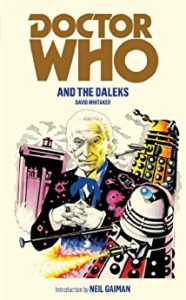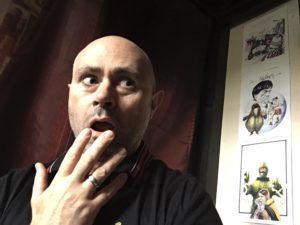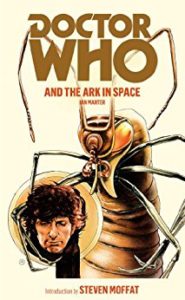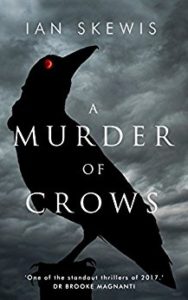Guest Post: Ian Skewis – Serial Heroes
Serial Heroes – I am 43 years old and there are two heroes that I have loved for as long as I can remember. Their adventures are known to millions but perhaps you may not immediately associate either of them with books? The first is the Web-Slinger…The Amazing Spider-man, the hero who should not even be a hero. “Just a Kid”, “How Can a SPIDER be a good guy”? But of all the costumed crime fighters I love to read about, Spidey is the undisputed champ.
But I mentioned two heroes and now I am passing the baton over to my guest, Ian Skewis, to explain why my other choice is a true Serial Hero….
Doctor Who.
Just those two words conjure up images of wide-eyed geniuses, battered police boxes and terrifying villains; unconvincing special effects, dodgy performances and endless corridors that all looked the same. And Daleks. Always Daleks.
 I first saw the legendary Time Lord on television in black and white (we couldn’t afford a colour telly at that time) in 1974 when Jon Pertwee regenerated into the wonderful Tom Baker. The giant spiders in that story gave me the creeps and the materialisation of one of them in the centre of a circle of followers is still one of my earliest memories. I hid behind a cushion (not the sofa) when the following year Davros, creator of the Daleks, made his debut. From then on I was (and still am) hooked.
I first saw the legendary Time Lord on television in black and white (we couldn’t afford a colour telly at that time) in 1974 when Jon Pertwee regenerated into the wonderful Tom Baker. The giant spiders in that story gave me the creeps and the materialisation of one of them in the centre of a circle of followers is still one of my earliest memories. I hid behind a cushion (not the sofa) when the following year Davros, creator of the Daleks, made his debut. From then on I was (and still am) hooked.
But other than the TV show itself and all the related merchandise there wasn’t much scope for reliving the excitement of what was on the screen. We played at being Daleks in the school playground. We talked avidly about the latest episode. We even saw the occasional repeat. But that was it. Those were hungry days.
Then my dad bought me ‘Doctor Who and the Daleks’ by David Whitaker – and I was hooked all over again. It was published in paperback by Target, who would go on to publish loads more in their successful series. It was amazing to be able to read this story, which was legendary, as it hadn’t been on television since 1963, and this was the only way to get a sense of how exciting it must have been to see something so close to the programme’s genesis. And it marked the debut of the Daleks themselves. I loved it. The story had me in awe from the first page; the atmosphere of the dead planet, soaked in radiation and filled with all sorts of hazards; the claustrophobia of the metallic city and the description of the squat and machine-like Daleks with their battle cry of ‘Exterminate!’
This extract is from when one of the Doctor’s companions, Ian, (I wish it had been me!) wakes up from his first trip in the Tardis to discover that he has arrived on a desolate planet, which we later learn is Skaro – planet of the Daleks!
‘White, dead-looking trees, a kind of ashy soil, a cloudless sky. The heat fanned my face as I stopped at the doorway of the ship. I heard Barbara make a small sound in her throat beside me. Somebody touched me on the arm and handed me my shoes which I put on, only half aware that other hands were tying the laces. I heard Susan’s voice telling me I ought not to walk about in stockinged feet, because there was no telling what the ground would be like. I didn’t do any of the conventional things that one reads about, like pinching myself or rubbing my eyes. I just stood there and stared about me, a dead horror of total realisation creeping through my body.’
 One other thing that made these books so attractive was the beautiful front covers, which were designed by the artist Chris Achilleos. They truly are works of art and I still have some prints of those covers on my wall, (see photo) some of which are signed by him. The books were also illustrated with black and white drawings inside, though the drawings were dropped some time later. I read that first book many times over. In the age before video it was the nearest we could get to repeat viewings, something alongside DVDs and satellite TV that we now all take for granted.
One other thing that made these books so attractive was the beautiful front covers, which were designed by the artist Chris Achilleos. They truly are works of art and I still have some prints of those covers on my wall, (see photo) some of which are signed by him. The books were also illustrated with black and white drawings inside, though the drawings were dropped some time later. I read that first book many times over. In the age before video it was the nearest we could get to repeat viewings, something alongside DVDs and satellite TV that we now all take for granted.
I wanted more. Of course I did! In the ensuing years I managed to get hold of many Target titles. Terrance Dicks was the most prolific writer of the series, and I think I have pretty much all his books from the Target range.
Then they released An Unearthly Child in book form in 1981 and that was truly amazing. If memory serves it came soon after the BBC repeated some episodes from the early years, including the very first episode ever made. It was fascinating to watch it in creaky black and white. I still believe that it is the most monumental debut in television history. The book version was equally good – with its description of the junkyard containing the old battered police box that also happened to be a transcendentally dimensional spaceship that travelled through time.
But the TV series and the books were changing – for the worse. Doctor Who began to go off the rails a bit. I still watched it avidly though and I still read many of the book titles that were released too. In 1989 the series was finally taken off the air and so, with the exception of the maligned movie in 1996 the books once again became an important source of food for us hungry Who fans. We had video and DVD by now but the books, now published by BBC Worldwide, were becoming more mature and exploring adult themes which the series could not.
 A perhaps rare and early example of this can be seen with Ian Marter’s gory version of The Ark In Space. It should be noted that he was also famous for playing one of the Doctor’s companions, Harry Sullivan, and he wrote several more Target titles. This sequence from The Ark In Space is particularly memorable:
A perhaps rare and early example of this can be seen with Ian Marter’s gory version of The Ark In Space. It should be noted that he was also famous for playing one of the Doctor’s companions, Harry Sullivan, and he wrote several more Target titles. This sequence from The Ark In Space is particularly memorable:
‘Slowly Noah turned his head fully towards them. The whole of the left side of his face was transformed into a shapeless, suppurating mass of glistening green tissue, in the midst of which his eye rolled like an enormous shelled egg. As they stared at him horrified they could almost detect the spreading movement of the alien skin.
‘It… it feels near… very near… now,’ he croaked.
As he tried to speak, a ball of crackling mucus welled out of the dark slit that was his mouth and trickled down the front of his suit. He stumbled forward. ‘Vira… vira… ‘ He threw the paralysator at Vira’s feet. ‘For pity’s sake… kill me… kill me now,’ he pleaded, his voice barely intelligible. Then he reeled back with an appalling shriek into the airlock as, with a crack like a gigantic seed pod bursting, his whole head split open and a fountain of green froth erupted and ran sizzling down the radiation suit, burning deep trenches in the thick material. The shutter closed.’
A far cry from the transmitted TV version where all of the above was achieved with some bubble wrap and green goo!
Of course, since then Doctor Who has returned and is as successful as ever. Books are still being published in relation to the series – but I’ll always have a fondness for those old Target paperbacks.
And for that hero of mine, The Doctor – A hero for all times…
Ian Skewis is the author of the No 1 Best Seller: A Murder of Crows. Ian worked as a professional actor before moving his focus to writing.
You can find Ian at: ianskewis.com or on Twitter as @ianskewis
You can order Ian’s No 1 Bestseller A Murder of Crows here: https://www.amazon.co.uk/Ian-Skewis/e/B06XX5C8BK/ref=sr_ntt_srch_lnk_1?qid=1507407754&sr=8-1
